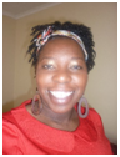Black Missionary African Roots – J. Ayana McCalman
What is your image of a missionary? In particular a Christian missionary? When I picture Christian missionaries I see an older, white man from Europe whose proclamations of the Christian faith is to be viewed with suspicion, questioned or challenged. So being called by God and the church to use my gifts and work as a missionary was both ironic and perplexing.
Ironic because to me I defy the missionary image that I came to know in every way. I am a young, black, woman from the Caribbean. I had never seen any black missionaries on the walls of my church which is described as a ‘missionary church’ back home (in Guyana). Unlike many of the white missionaries I read about, no one in my family as far as I know had ever been a missionary. In fact all the missionaries I had ever seen or read about were white. Perplexing because I had read and heard discussions about how the Christian missionary enterprise had destroyed or diminished the indigenous culture, traditions and faith beliefs in many parts of the world including Africa. And in today’s world many people in and outside of the church question the integrity and the authenticity of its religious claims and practice of justice.
The word ‘missionary’ itself can be loaded depending on your perspective and world view. So I need to give a sense of my own leanings on the matter and the perspective from which I share this brief first note. I serve as a Council for World Mission (CWM) missionary in South Africa. This quote from CWM’s ‘Everywhere to Everywhere’ Sharing people in Mission Handbook resonates with me. It describes my perspective and understanding of my role as a missionary: “No church can claim to possess the whole truth. We therefore need each other. Through the sharing of personnel the churches learn from each other of the variety of Christian witness and faith experiences. God was always there before the arrival of a missionary. In CWM, missionaries go to a host community to learn as well as to share their faith and skills and, together with the host community, discern the presence of God and the activity of the Holy Spirit.”
From this perspective being a black missionary in Africa in 2013 is definitely interesting, challenging, exciting and a learning experience. As a lay person, I do not come to the context with the theological leanings of the ordained, rather I come with other gifts and skills within the areas of law and communication which I share with God’s people here in South Africa – position which is both humbling and uplifting at the same time. For, in one instance, I seek to offer gifts and skills which are not unique to my context (Guyana), but which also offer an additional perspective on communications and advocacy in collaboration with my African sisters and brothers. On the other hand, I am not a missionary in the age-old context and so offer to my own roots that which uplifts and empowers. I also feel especially grateful and privileged to have the perspective of living and working in South Africa on the African continent. And so, I am able to sense God’s presence affirming and confirming my presence in this place.
In February 2013 I visited Cradle of Humankind here at Maropeng in South Africa. It was a poignant moment for me. Maropeng means “returning to the place of origin” and in this season of my life my relocation to South Africa is a symbol of origin and new beginnings. These words inscribed on a rock at Maropeng ring with truth to me –“All of humanity shares an African heritage. We are one diverse species across the globe with our roots in Africa.” Whether I am in Guyana or South Africa, my roots remain the same – I am a Black woman with strong African roots. And, when I travel around Jozi or prepare monthly publications for the church family of the UCCSA across Southern Africa, I am also aware of my other roots – my spiritual roots in Christ Jesus which affords me the privilege to cross the globe and still be understood and pertinent. So I am inspired to remain open, to be willing to learn and to share learnings, and to do my best to live in harmony and show respect towards those I will encounter on this journey, in this new place and beyond.
In what ways does Ayana’s initial perspective about missionaries match yours toward any particular group of persons? How did God respond to you in those instances?
Have you been called to a ministry which seems contrary to everything you thought you are called to be? What was your response?
Do you agree with Ayana’s decision to walk in harmony and respect of those with whom she connects on this new journey? Why/not?
Ayana McCalman is a young lawyer from Guyana. She relocated in January 2013 to South Africa to serve as a CWM Missionary from the Guyana Congregational Union (GCU) church to the United Congregational Church of Southern Africa (UCCSA); both member churches in CWM. Ayana serves as the Communications and Justice Advocacy Officer of UCCSA. UCCSA is one church in five countries- Botswana, Namibia, Mozambique, South Africa and Zimbabwe. Her core responsibilities include the publication of a monthly newsletter to UCCSA’s member churches and mission partners; accompanying local churches to tell their stories; facilitating conversations about advocacy and social justice issues in the church and in social media. She writes daily updates for the UCCSA Facebook page-Congregationalists. She lives and works in Johannesburg, which she now fondly calls Jozi.


